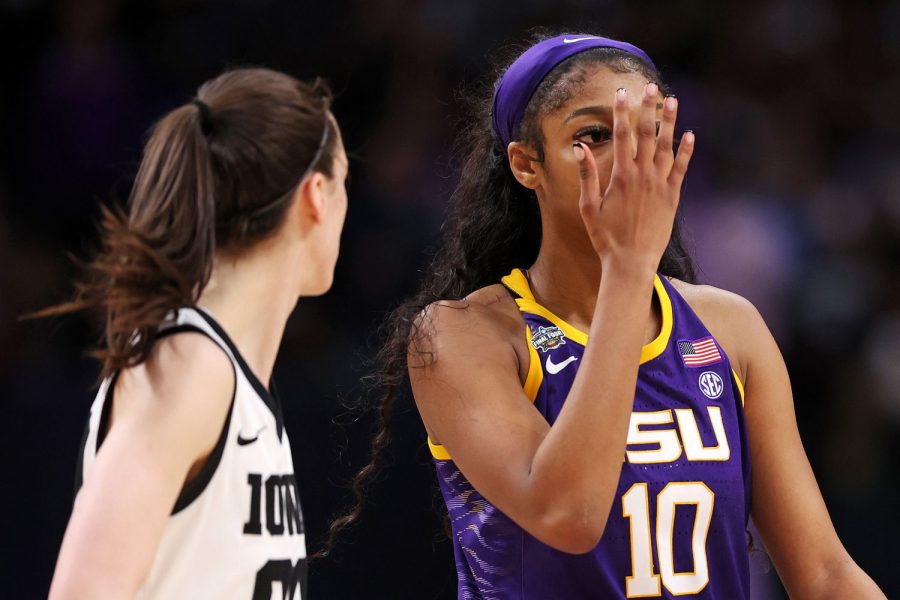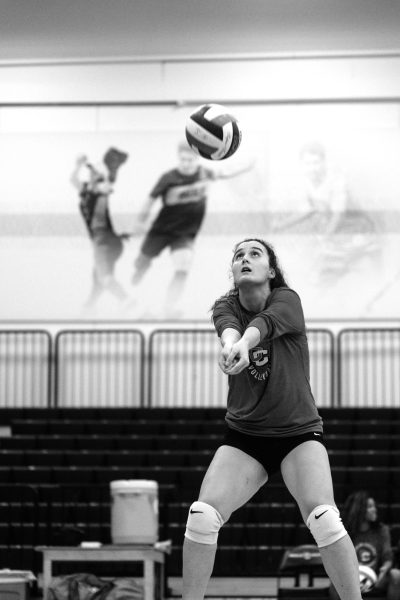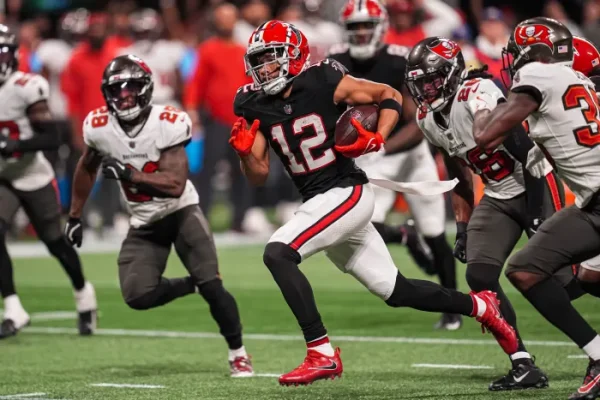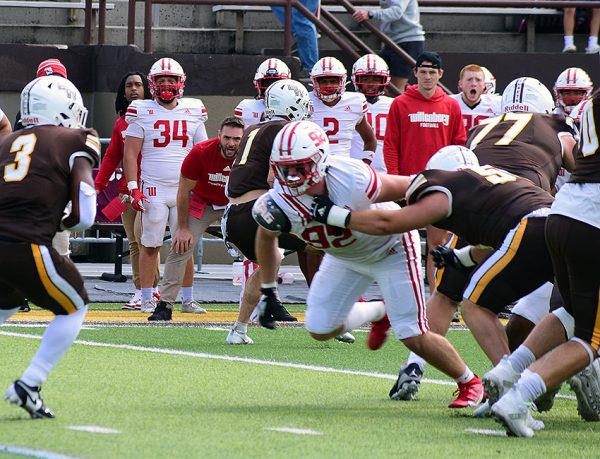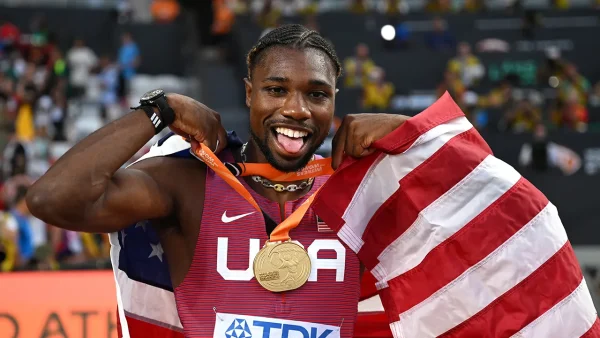Caitlin Clark, Angel Reese Drama Taken Out Of Proportion
Photo courtesy of Maddie Meyer
Angel Reese and Caitlin Clark competed in the March Madness women’s championship game.
If you’re just learning the names Caitlin Clark and Angel Reese after last weekend, you’re not alone. The 2023 March Madness women’s final game received national attention — 12.6 million viewers at its peak, to be exact — not because of any player’s individual performance, but primarily after a move LSU forward Reese made: the “you can’t see me” gesture. This gesture, a wave in front of the face popularized by wrestler John Cena, was one that Iowa guard Clark previously pulled during her game against Louisville in the Elite Eight. While both players are known for trash talk and insults on the court, Reese’s move sparked immediate controversy, with the word “CLASSLESS” trending on Twitter. Her use of the gesture only attracted more criticism after First Lady Jill Biden proposed inviting both LSU and Iowa to the White House, breaking the tradition of only inviting the winning team.
As an Iowa fan over the past three years, I have seen Clark and UConn’s Paige Bueckers’ showdown in the Sweet Sixteen, their upset by Creighton in the second round, and now an incredible and historic run to the finals in 2023. It was obviously disappointing when Iowa lost in the finals, but even speaking as a fan, the attempts to defend the team that came from both Iowa fans and people who had just learned about women’s basketball — as suggested by errant spellings like “Angela Reese” and “Caitlyn Clarke” — have gotten out of hand.
Although Jill Biden backtracked on her statement through her press secretary, the idea of inviting Iowa to the White House is insulting to both teams. It implies that LSU needs to share its spotlight and cannot have the glory of its victory to itself, and that Iowa should be coddled and treated differently simply because, like the other 66 teams in the tournament, the results were not what it had hoped for.
Additionally, Clark is well known in the world of women’s basketball for her trash talk, despite the justifications about the length and energy of Reese’s taunting in order to defend Clark’s “class.” Last year in a game against Ohio State, she mimicked Michael Jordan’s shrug — an iconic expression of nonchalance after scoring a series of improbable 3-pointers — and in this year’s tournament, she’s made moves such as telling Hailey Van Lith, a Louisville player and former USA Basketball teammate, to shut up, and waving her hand in a shooing motion directed at South Carolina guard Raven Johnson in the Final Four. There was a section on ESPN where she was called “The Queen of Clapbacks.” And, of course, there was Clark’s own “you can’t see me” gesture. With her history of trash talk, Clark is aware of when to give it and when to take it. Both players have spoken about such exchanges as an important and integral part of the game, and Clark defended Reese in an interview after receiving the Wooden Award.
“I’m just one that competes, and she competed,” Clark said. “I think everybody knew there was gonna be a little trash talk in the entire tournament. It’s not just me and Angel.”
But before the interview, and even afterward, it was bizarre seeing people bend over backward trying to uplift one and vilify the other — people rushed to Clark’s defense when she never needed protection in the first place. If there’s anyone who needs the extra support, it’s Reese and the LSU team, who have been subjected to unfair, racist attacks on their physical appearance, intelligence, and character.
The so-called drama was exacerbated partially by preexisting racialization. For instance, one tweet compared the mostly white Iowa team listening to the High School Musical 2 soundtrack with the predominantly Black LSU team rapping to Boosie — omitting the context that Iowa was warming up while LSU celebrated a win. To be clear, conversations should absolutely take place about the policing of Black women’s emotions in the media, the double standard to which Clark’s versus Reese’s trash talk was held, the racist harassment Reese has been receiving since high school, and the appropriation of Black English and culture. But pitting teams against each other simply because of race was unnecessary, unhelpful, and ultimately, only added fuel to the fire.
As Van Lith stated after an altercation with Texas guard Sonya Morris in the handshake line after the second round, drama about trash talk in any women’s game would have never been started if it were in the men’s tournament.
“I mean, that happens in the NBA game[s] every single day,” Van Lith said in a press conference. “Just because it was women’s basketball, they’re going to drag it out and it’s a whole deal.”
What should be remembered from this tournament is the historic runs of both teams, as well as many others. There were several exciting upsets that took out all the No. 1 seeds, such as Mississippi and Miami’s wins over Stanford and Indiana, respectively. Clark, and many Iowa-born players, chose Iowa over other prestigious schools in hopes of rebuilding the program, and as a result of their dedication, they made it to the Final Four for the first time since 1993. LSU won its first March Madness in either the men’s or women’s tournaments, thanks to Jasmine Carson and Last-Tear Poa’s unexpected 3-pointers that cemented the lead in the second quarter. And Angel Reese went from a freshman at Maryland out with a foot injury to a March Madness champion, as well as a role model for Black girls and women in sports through her authenticity and confidence.
“I’m too hood, I’m too ghetto,” Reese said in a press conference after the championship. “Y’all told me that all year. But when other people do it, y’all don’t say nothing. So this is for the girls that look like me.”
In the end, trash-talking is important to women’s sports, but it should not be the only reason why women’s basketball is making headlines. There is so much more to celebrate than those ten seconds.


